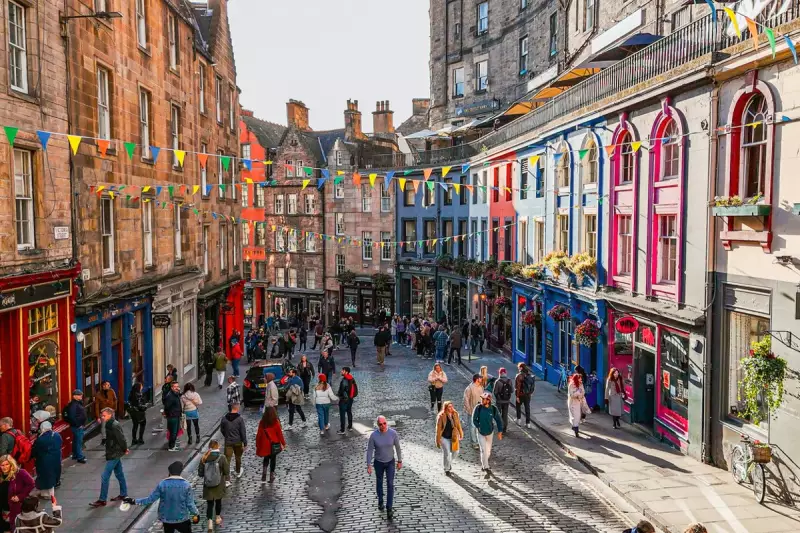
British cities are increasingly joining European destinations in charging visitors overnight fees, with Edinburgh set to become the first UK city to implement an official visitor levy in July 2026. The trend sees local authorities across Scotland and Wales preparing similar measures, while English cities like Manchester and Liverpool have already found legal workarounds to introduce their own charges.
What Exactly Are Visitor Levies?
The terms "tourist tax" and "visitor levy" are often used interchangeably, though UK authorities typically prefer the latter. Essentially, both refer to charges applied to short-stay accommodation within a local authority area. Contrary to what the name might suggest, these levies generally apply to all visitors regardless of whether they're travelling for business or pleasure, with limited exemptions for specific circumstances.
Charges typically take the form of either a flat rate per room per night or a percentage of the accommodation cost. Exemptions vary between local authorities but may include children, those travelling for medical treatment, or individuals escaping domestic violence situations.
Scotland Leads the Way with Official Legislation
Scotland became the first UK nation to establish a legal framework for visitor levies when the Visitor Levy (Scotland) Act passed in September 2024. This legislation empowers local councils to implement overnight accommodation taxes, provided they consult with local businesses, communities, and tourism organisations first.
Edinburgh made history in January 2025 by voting to introduce a five per cent surcharge on overnight stays, scheduled to take effect from July 2026. Accommodation providers must apply this levy to advance bookings made after 1 October 2025 for stays commencing on or after 24 July 2026.
Glasgow will follow with its own five per cent levy starting 25 January 2027, while Aberdeen plans a slightly higher seven per cent charge from 1 April 2027. The funds raised will be reinvested into local facilities and services that benefit visitors and residents alike.
Wales Follows Close Behind
Wales joined Scotland in establishing a legal basis for tourist taxes when the Senedd passed the Visitor Accommodation (Register and Levy) Etc. (Wales) Bill in July 2025. This legislation grants Welsh councils the authority to implement overnight stay taxes, with the earliest possible implementation date being April 2027.
The Welsh system will charge per person per night, with campsites, hostels, and dormitories charging 75p per person nightly, while other accommodation types will levy £1.30 per person per night. Exemptions include stays exceeding 31 nights in a single booking, emergency housing arranged by councils, and under-18s staying at campsites, hostels, or dorms.
England's Creative Approach Through Business Improvement Districts
While England lacks national legislation permitting visitor levies, several cities have implemented similar charges through Accommodation Business Improvement Districts (ABIDs). These independent not-for-profit organisations allow local businesses to collectively fund community projects that ultimately benefit them.
Manchester pioneered this approach in England, charging guests £1 per room per night within the Manchester ABID zone. The organisation reports that both guests and accommodation providers have "warmly welcomed" the levy, with generated funds supporting bids for major events like the Brit Awards and NBA sports competitions.
Liverpool introduced its own ABID levy in June 2025, with approximately 100 participating hotels charging guests £2 per night. The Liverpool ABID expects this to generate £9.2 million over two years, with £6.7 million dedicated to supporting the city's visitor economy.
Bill Addy, CEO of Liverpool BID Company, explained that despite Liverpool not suffering from overtourism, the levy forms part of a strategy to distribute visitor flow more evenly throughout the week. "Our corporate base isn't as strong as it could be," Mr Addy told The Independent, noting the focus on attracting business events during quieter mid-week periods.
Remarkably, Liverpool recorded its best July for room bookings immediately after introducing the BID levy this summer. "That speaks for itself," Mr Addy commented. "Tourists are used to city charges; ours is a minimal, fixed fee that is easily communicated and absorbed."
Growing Calls for Expanded Tourist Tax Powers in England
The success of ABIDs in Manchester and Liverpool has sparked calls for broader tourist tax powers across England. In June 2025, several mayors backed a campaign led by Liverpool mayor Steve Rotheram, warning that England risks "falling behind" as Scotland and Wales advance their own visitor levy schemes.
Mr Rotheram advocates for a more comprehensive approach than Liverpool's current ABID, which focuses primarily on the city centre. "What I would like to see is a levy that spans across all six districts and shares the benefits between them," he stated.
The mayor estimates that a five per cent charge on overnight stays could generate approximately £17 million annually for Liverpool, funds that could "transform the visitor economy and make it more attractive for international visitors."
Other prominent supporters include London Mayor Sadiq Khan, whose spokesperson confirmed that "The Mayor believes that a modest tourist levy, similar to other international cities, would boost our economy, deliver growth and help cement London's reputation as a global tourism and business destination."
Councillors from tourism-heavy areas including Brighton, Bath, Cambridge, Oxford, and Cornwall have also expressed support for visitor levy powers, arguing they would help manage high tourist numbers and reinvest in local infrastructure.
Opposition and Concerns
Not all stakeholders welcome the prospect of widespread tourist taxes. UKHospitality, the trade body representing the sector, released a statement earlier this year warning that such charges could deter both international visitors and domestic staycationers, ultimately harming businesses, the economy, and consumers.
In Bournemouth, hoteliers successfully appealed against a proposed £2 visitor levy, arguing it would "financially penalise" the 75 hotels in the seaside resort. The town's attempt to establish an ABID failed in January 2025 due to an administrative error.
Meanwhile, Northern Ireland's Department for Economy confirmed that "No plans are under consideration to introduce a tourism levy in the north," positioning the region as an exception within the UK's evolving tourism taxation landscape.
As UK cities continue to explore visitor levies as tools for tourism management and revenue generation, travellers should prepare for additional accommodation charges becoming increasingly common across the country.





